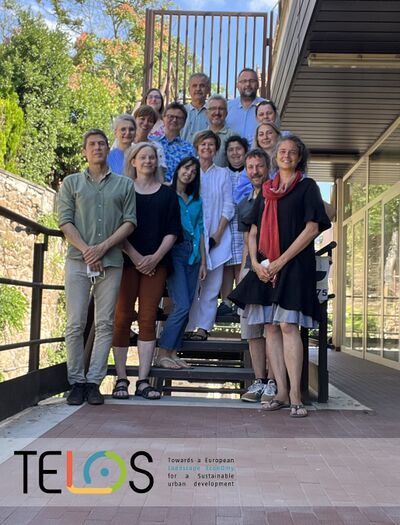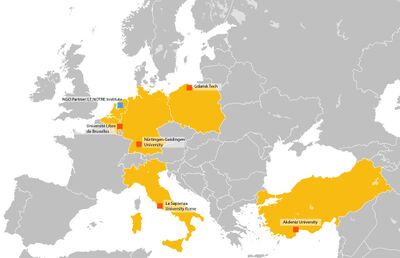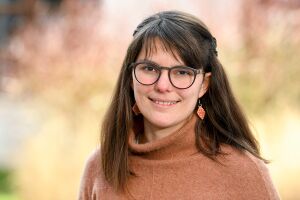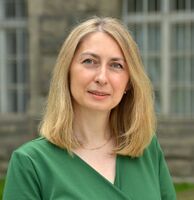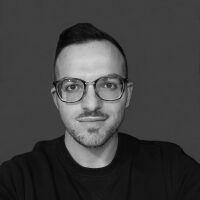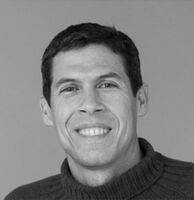TELOS Team: Difference between revisions
| Line 60: | Line 60: | ||
File:Juan_Jose_Galan_Vivas.jpg|'''Juan Jose Galan Vivas, Team Member''': Juanjo Galan-Vivas is an Associate Professor in the Urban Planning Department of the Polytechnic University of Valencia (Spain). From 2015 to 2020, he served in a similar position at Aalto University (Finland). His teaching and research focus on landscape planning, landscape design, sustainable development, regional and urban planning, and, on a more general level, on the intersections between social and ecological systems. He coordinated the Sierra Calderona Strategic Plan (2013-2014) and the AELCLIC project for the Adaptation of European Landscapes to Climate Change (2018-2020). From 2017 to 2020 he was the promoter and chair of the Landscape Observatory of Finland. '''Motivation for TELOS project:''' The configuration and evolution of the landscape are highly influenced by economic processes framing the interactions between people and the environment. The TELOS project gives an opportunity, in landscape architecture education, to align those processes with the generation of more sustainable, inclusive, resilient, and democratic landscapes. | File:Juan_Jose_Galan_Vivas.jpg|'''Juan Jose Galan Vivas, Team Member''': Juanjo Galan-Vivas is an Associate Professor in the Urban Planning Department of the Polytechnic University of Valencia (Spain). From 2015 to 2020, he served in a similar position at Aalto University (Finland). His teaching and research focus on landscape planning, landscape design, sustainable development, regional and urban planning, and, on a more general level, on the intersections between social and ecological systems. He coordinated the Sierra Calderona Strategic Plan (2013-2014) and the AELCLIC project for the Adaptation of European Landscapes to Climate Change (2018-2020). From 2017 to 2020 he was the promoter and chair of the Landscape Observatory of Finland. '''Motivation for TELOS project:''' The configuration and evolution of the landscape are highly influenced by economic processes framing the interactions between people and the environment. The TELOS project gives an opportunity, in landscape architecture education, to align those processes with the generation of more sustainable, inclusive, resilient, and democratic landscapes. | ||
File:Roxana Triboi portrait.jpg|'''Roxana Triboi, Team Member''': Roxana Maria Triboi is an PhD architect and urban planner that specialised on sustainable food planning. Currently, she is coordinating the food thematic evaluation of the European Urban Agenda and AESOP4food ERASMUS+, a transdisciplinary and participatory program on sustainable food planning and involved in different programs for LE:NOTRE Institute, French Territorial Food Strategies consultancy and managing a community garden. | File:Roxana Triboi portrait.jpg|'''Roxana Triboi, Team Member''': Roxana Maria Triboi is an PhD architect and urban planner that specialised on sustainable food planning. Currently, she is coordinating the food thematic evaluation of the European Urban Agenda and AESOP4food ERASMUS+, a transdisciplinary and participatory program on sustainable food planning and involved in different programs for LE:NOTRE Institute, French Territorial Food Strategies consultancy and managing a community garden. | ||
File:BeataDreksler.jpg|'''Beata Dreksler, Team Member''': Beata Dreksler is an Assistant Professor of Landscape Architecture at the American University of Beirut. She holds a Ph.D. in landscape architecture from Warsaw University of Life Sciences—SGGW, Poland, and has over 30 years of experience across Europe, Central America, and the Middle East. Beata has contributed to projects ranging from urban revitalization to community-focused green spaces. Her current research explores landscape democracy and digital transformation, including Virtual Reality applications in design. '''Motivation for TELOS project:''' Participating in the TELOS project is an exciting opportunity to address the critical intersection of landscape and economy, a perspective increasingly vital in our field. This project offered a unique platform for contributing to the development of landscape architecture education, redefining the profession, and integrating economic frameworks into landscape architecture for long-term community benefits. | |||
</gallery> | </gallery> | ||
Revision as of 10:22, 21 November 2024
Germany - Nürtingen-Geislingen University (NGU)
- university website, project coordination and grant holder
Dr. Ellen Fetzer, Project Coordinator: Ellen Fetzer holds a doctoral degree in landscape architecture from Kassel University, Germany. The focus of her work at Nürtingen-Geislingen University is on computer-supported collaborative learning and education for sustainable development in various contexts and settings. She is course director of the international Master programme in landscape architecture. She is immediate past-president of ECLAS, the European Council of Landscape Architecture Schools. Ellen leads the TELOS ERASMUS project. Motivation for TELOS project: Enhancing systems thinking, critical thinking and creative imagination for turning conflicts into opportunities
Prof. Dr. Dirk Funck, Team Member: Prof. Dr. Dirk Funck is a lecturer for Multichannel-Retailing, Sales, Social Innovation and Methodical Basics at Nürtingen-Geislingen University. His interests in research and transfer lie in the topics of "Medium-Sized Retail", "Sustainable Community Development" and "Social Innovation". He is leading the DAAD-funded project “Middle East Productive Landscapes” (MeProLand). After his studies, doctorate, and research activities at the University of Göttingen, Dirk spent eight years in leading positions in medium-sized retail cooperation. In 2011, he was appointed professor at the University in Worms. In 2014, he moved to Nürtingen-Geislingen University. Dirk was elected Chairman of the Advisory Board of the Rid Foundation for Medium-Sized Bavarian Retailers in 2011. He also works for the foundation as a trainer and coach. Motivation for TELOS project: Teaching means touching someone's life.
Dr. Dorothee Apfel, Team Member: Dorothee Apfel is a research associate at the Nuertingen-Geislingen University (NGU). Her research focuses on sustainable energy transitions from a social science perspective, particularly multi-level governance, power relations, regional development and agency. She also investigates concepts of sustainable development in higher education with a focus on interdisciplinary approaches. She holds a Dipl. degree (= MA) in geography, and is currently completing her dissertation at the Institute of Geography at the University of Tübingen. Before she started working at the NGU in 2017, she worked for the city of Kornwestheim, RWTH University Aachen and Prognos AG in the fields of adaptation to climate change, climate mitigation, and energy in urban development. Motivation for TELOS project: Dorothee Apfel joined the TELOS project convinced that sustainable development can only succeed if the given challenges are approached in an interdisciplinary way. In addition, the project offers intercultural perspectives, which adds further value and makes it unique. Dorothee brings her expertise in the field of energy.
Anna Szilágyi-Nagy, MEng:Anna Szilágyi-Nagy is a Hungarian landscape architect graduated at the HfWU Nürtingen-Geislingen, Germany. She works at the Competence Center of Learning at the HfWU Nürtingen-Geislingen in the field of Method Participation & Game. In collaboration with the University of Tübingen, she is writing her doctoral dissertation on participatory landscape processes supported by games. As the president of the Hungarian kultúrAktív Egyesület, she supports the involvement of young people in urban planning and open space design projects. As the secretary of the LE: NOTRE Institute, she supports the meeting and exchange of experiences of practicing European landscape architects, instructors and students. Motivation for TELOS project: What motivates me to participate in the project is that I can learn business thinking, which can help in the realization of the landscape visions created with the community. In addition, I would like to use playful methods to support the toolbox of business development and make meetings and programs cheerful.
Belgium: Université Libre de Bruxelles Faculty of Architecture La Cambre Horta
- university website, Project partner
Didier Vancutsem, Team coordinator: Didier Vancutsem holds bachelor and master’s degrees in landscape architecture, city and regional planning and regional management. He is Assoc. Prof. at the ULB Free University of Brussels – Faculty of Architecture La Cambre Horta since 2009, involved in Landscape Architecture and Urban Planning Master programs as well as research. As director of the planning office “urban scape” Munich since 1992, Didier has gained professional experience worldwide in urban innovation, landscape management, elaboration of national and regional strategies for integrated urban development in Europe and Middle East, Africa, Russia, Asia. He is active as registered expert for the European Commission and URBACT, UN-Habitat and involved in European and international research projects. He was IFLA Europe delegate for Belgium (1994-1998) (2013-2021), Secretary General (2013-2019) of ISOCARP the International Society of City and Regional Planners, and is currently director of the ISOCARP Institute, its research branch. Since October 2021, he is Vice-President Professional Practice of the International Federation of Landscape Architects Europe.
Motivation for TELOS project: Every human activity interacts with the landscape and aims at concrete results, which are connected to economy. Consequently, every human intervention is motivated by achieving economic results in transforming everyday landscape. Didier is very happy to be able to contribute to the outcomes of TELOS, as this project will demonstrate this interaction and how added-values, trends and impacts become tangible in humanity’s landscape.
Claire Pelgrims, Project Researcher: Pelgrims Claire (PhD) is a researcher in Urbanism and mobility studies at the Gustave Eiffel University, France and teaching at the Université Paris Cité, France and at the Université libre de Bruxelles, Belgium. Her PhD thesis focused on imaginaries of fast and slow mobilities in the evolution of Brussels mobility infrastructure since the middle of the 20th century. Her postdoctoral research now focuses on expanded understanding of mobility infrastructure in relation to gender, aestheticism and functionality. She is working with an European Marie Skłodowska-Curie postdoctoral fellowship on a research project about gender and bicycling aesthetics, looking at gender construction processes across cycling practices, equipment and infrastructure (H2020, SENCyclo 2022-2023).
Claire is also involved at ULB in the PDR FNRS "Gender and Bicycling Aesthetics" (2021-2024). She has been involved in researches on Brussels metropolitan cultural and mobility infrastructures (18th-21st century) (micm-ARC) and on sustainable transition of company mobility (BSI chair). She has been associate researcher at the Laboratory on Urban Sociology [LaSUR], EPFL and the University Observatory of Cycling and Active Mobility (OUVEMA), UNIL, Switzerland. She is the Executive Secretary of the International Association for the History of Traffic, Transport and Mobility [T2M], and is involved as member in other international networks such as P2M, the International Ambiances Network, ICSA and EAUH.
Poland: Gdańsk University of Technology
- university website, Project partner
Karolina Krosnicka, Team Coordinator: Karolina A. Krośnicka, (Ph.D., D.Sc., Eng., Arch.) is a professor at the Department of Urban Design and Regional Planning, Faculty of Architecture, Gdańsk University of Technology (Poland). Karolina’s research interests focus on port-city spatial relations, Integrated Coastal Zone Management, theory of urban dynamics, and evolution of landscapes. While she was employed at the Faculty of Navigation at Gdynia Maritime University (Poland) she concentrated on seaport and terminal planning. She collaborates with local authorities and companies and has rich educational experience. She is a member of the Society of Polish Town Planners, the International Society of City and Regional Planners, and the World Institute for Engineering and Technology Education. Motivation for TELOS project : Within the last 30 years, along with the socio-economic transformation, some of the cultural landscapes disappeared, and some new emerged. However, not all of these changes were heading towards the sustainable transition of ecosystems. TELOS project and in-depth understanding of landscape transformation costs could enable the planning of urban developments in a holistic and resilient way.
Dorota Jankowska, Team Member: Dorota Wojtowicz-Jankowska is a Professor at the Faculty of Architecture of the Gdańsk University of Technology. She is employed at the Department of Environmental Design. She is a promoter of many diplomas on bachelor's and master's levels. In her research work, she is concerned about the problems related to exposition spaces and shaping the city’s landscape. Among her research interests are problems of creating cultural spaces such as museums, galleries, and urban areas used for various forms of presentation. She popularizes scientific experience in cooperation with local governments and public institutions. Motivation for TELOS project : Dorota was motivated to be part of the TELOS project by my curiosity of understanding the landscape through different scientific disciplines and their representatives. Being a part of TELOS team helped to build her knowledge, and consciousness of the complex concept of the landscape.
Magdalena Rembeza, Team Member: Magdalena Rembeza is a tenured Assistant Professor at Gdańsk University of Technology, Poland, where she completed her doctorate. She is also a member of the Board of the Revitalization Forum Association. She gained her professional experience in Poland, England, Germany and the United States. She is also a scholarship holder of the Kosciuszko Foundation in 2014. In years 2014-15, she has completed the SPURS Program at the Massachusetts Institute of Technology (MIT), USA. Her research interests and practice focus on widely understood revitalization of contemporary cities and its public space, also with the use of art and culture.
Katarzyna Zielonko-Jung, Team Member: Katarzyna Zielonko-Jung – an architect, academic lecturer, scientist, professor at Gdańsk University of Technology at the Department of Environmental Design. She has co-created the program for postgraduate studies in Ecological Architecture and Construction and is a lecturer there. She has authored numerous Polish and foreign publications related to ecological architecture issues, in particular their relationship with microclimatic phenomena in the urban environment. She participated in research projects focused on sustainable architecture and improving the quality of city climate. She is a member of Gdańsk Architecture Council, UN Global Poland Climate Council, Mazovian District Chamber of Architects, and Association of Polish Architects. Motivation for TELOS project : Katarzyna is motivated to be part of the TELOS because it is a great opportunity to combine her experience and competencies with the knowledge of specialists from other disciplines. This will allow her to better understand the phenomenon of landscape and participate in discussions about its economic value.
Gabriela Rembarz, Team Member: Gabriela Rembarz PhD, is adjunct at the Gdansk University of Technology, Poland. She studied architecture, urban planning and environmental protection in Gdansk (GUT), Warsaw (WUT) and at the University Stuttgart (as a DAAD-scholar). She is also MIT_DUSP_SPURS Fellow 2012, recently cooperating with the Fulbright Poland. She is a member of the Society of Polish Town Planners (TUP) and the German Academy for Urban Development and Regional Planning (DASL). Gabriela explores landscape urbanism, combining an academic approach with her practical planning experience, related to the large-scale urban street-network development. Such understanding of the contemporary planning challenges characterizes also her original programs of design studios, offered both to the Polish and international students at the GUT. Motivation for TELOS project : The need to complete interdisciplinary knowledge in field of urban landscape architecture and planning and interest in other teaching methods concerning no-technical issues in urban landscape planning are what motivate Gabriela to be part of TELOS project.
Turkey: Akdeniz University
- university website, Project partner
Veli Ortacesme, Team Coordinator: Veli Ortacesme has been trained as a landscape architect. His specialty and research interests include landscape planning, protected areas and urban green spaces. After having worked in private sector for two years, he moved to academia where he has been studying for more than 30 years. Currently, he has been teaching and conducting research at Akdeniz University, Faculty of Architecture, Department of Landscape Architecture in Antalya, Turkey. Veli has 35 years of experience in professional practice, education and research and published more than 200 articles, conference papers, research reports, book chapters and books. Motivation for TELOS project : The economic aspect of landscape receives little consideration in research as well as in the programs and actions. The TELOS Project deals with this issue in urban environments. What makes Veli more excited is the fact that the project aims to empower new generation of visionary professionals and decision-makers to address sustainability challenges.
Meryem Atik, Team Member: Meryem Atik is a full-time lecturer and researcher at the Department of Landscape Architecture, Faculty of Architecture, University of Akdeniz, Antalya Turkey. Her works focuses on the natural and cultural aspects of the landscape on special topics of cultural landscapes, landscape character analysis, rural landscapes, as well as landscape conservation, native plants, tourism and environment relations, planting design. She is the co-author of 10 English book chapters and recently the editor of Akdeniz University Journal of the Faculty of Architecture. Motivation for TELOS project : Human effort to benefit from nature is motivated by an economic purpose and resulted multiple relationship between culture and landscape. What motivates Meryem to be part of the TELOS project is to understand the intact relation between economy and landscape and to learn how such relation can be transferred in “sustainable” models.
Ibrahim Yilmaz, Team Member: Ibrahim Yilmaz is specialized in agricultural economics. His specialty and research interests include farm management and farm economics, agricultural cooperatives, rural development and agricultural marketing. After graduations he started to academia where he has been studying for more than 35 years. Currently, he has been teaching and conducting research at Akdeniz University, Faculty of Agriculture, Department of Agricultural Economics in Antalya, Turkey. Ibrahim has 37 years of experience in professional practice, education and research and published more than 150 articles, conference papers, research reports and book chapters. Motivation for TELOS project : As agricultural economists, Ibrahim works towards solving the problems encountered in agriculture by combining agricultural and economic sciences. With a similar approach, the TELOS Project is also concerned with the economic aspect of landscape in urban environments. What motivates Ibrahim is that the project allows him to apply his experience in a new field and aims to empower the next generation of decision makers to address sustainability challenges.
Italy: La Sapienza University Rome
- university website, Project partner
Maria Beatrice Andreucci, Team Coordinator: Architect, landscape architect and economist. She holds a Ph.D. Doctor Europaeus in Environmental Design and works as Research Professor at the Department of Planning, Design, Technology of Architecture, “Sapienza” University of Rome. She has published more than 100 scientific products, including 5 books, and has delivered more than 80 oral presentations and keynotes in international conferences and workshops. She is leading several Eu funded projects, and her work continues to engage environmental technological design, landscape ecology, and economic valuation as an evolving integrated framework, linking nature-based solutions’ performance assessment, economic valuation of ecosystem services, climate mitigation, and urban resilience capacity building. Motivation for TELOS project: Through active participation in TELOS, Maria expects to contribute – leveraging her background and experiences in the field of the Landscape Economy – to the dissemination, at an international level, of the relevance of the multiple social and economic benefits provided by nature-based solutions towards climate neutral, resilient, healthy, inclusive, and equitable neighborhoods and cities.
Marco Delli Paolo, Team Member 2023-2024: Architect, PhD in Environmental Technology Design. He is currently a postdoctoral researcher at Sapienza University of Rome (Italy), where he is carrying out research activities on Positive Energy Districts (PEDs) and climate-adaptive design strategies, combining them through a holistic approach to cope with the energy transition scenario. Expert in the field of Technology of Architecture from 2023 and member of the Italian Society of Technology of Architecture (SITdA). He is an active member of Working Group 4 of the COST Action “Positive Energy Districts European Network”, for which he holds the role of Grant Holder Manager. Additionally, he is involved in many international research groups, collaborating with researchers and professionals, including IEA Annex83, with the objective of elucidating the interrelated challenges associated with the PED model in urban areas.
Giulia Marredda, Team Member 2021-2022: Giulia Marredda is a Landscape Architect graduated at “La Sapienza” University of Rome. Her thesis in environmental design concerned the implementation of several solutions with different naturality gradients within the complex context of Port Island, in Gdansk. Thanks to that she was able to approach and be interested in concepts such as climate mitigation, nature-based soutions, blue-green infrastructure and ecosystem services. Motivation for TELOS project: Giulia is thrilled to be part of TELOS, as the project allows her to expand her knowledge of the landscape and its impact in economic terms, through a multidisciplinary and transnational approach.
The Netherlands: LE:NOTRE Institute
- website, Project partner
Jeroen de Vries, Team Coordinator: Jeroen de Vries, landscape architect, is a researcher at the LE:NOTRE Institute. His research focuses on food governance, the design of foodscapes in metropolitan areas, the productivity of different typologies of UA, and strategies to integrate these in the spatial design of urban and peri-urban areas. Jeroen combines work as a professional practitioner, lecturer, and researcher. He coordinated the theme of foodscapes in the LE:NOTRE Landscape Forums in Rome, Zagreb, Bratislava, and Rimini. Jeroen is active in a number of European educational and research projects that foster the quality in landscape education, research and practice. His mission is to support the academic community and the profession of landscape architecture on a European level. Motivation for TELOS project: The TELOS project offers a unique possibility to contribute to an often neglected aspect of landscape planning. Jeroen is motivated to include various dimensions of economy to develop landscapes with the lens of a common good - the landscape belongs to all.
Juan Jose Galan Vivas, Team Member: Juanjo Galan-Vivas is an Associate Professor in the Urban Planning Department of the Polytechnic University of Valencia (Spain). From 2015 to 2020, he served in a similar position at Aalto University (Finland). His teaching and research focus on landscape planning, landscape design, sustainable development, regional and urban planning, and, on a more general level, on the intersections between social and ecological systems. He coordinated the Sierra Calderona Strategic Plan (2013-2014) and the AELCLIC project for the Adaptation of European Landscapes to Climate Change (2018-2020). From 2017 to 2020 he was the promoter and chair of the Landscape Observatory of Finland. Motivation for TELOS project: The configuration and evolution of the landscape are highly influenced by economic processes framing the interactions between people and the environment. The TELOS project gives an opportunity, in landscape architecture education, to align those processes with the generation of more sustainable, inclusive, resilient, and democratic landscapes.
Roxana Triboi, Team Member: Roxana Maria Triboi is an PhD architect and urban planner that specialised on sustainable food planning. Currently, she is coordinating the food thematic evaluation of the European Urban Agenda and AESOP4food ERASMUS+, a transdisciplinary and participatory program on sustainable food planning and involved in different programs for LE:NOTRE Institute, French Territorial Food Strategies consultancy and managing a community garden.
Beata Dreksler, Team Member: Beata Dreksler is an Assistant Professor of Landscape Architecture at the American University of Beirut. She holds a Ph.D. in landscape architecture from Warsaw University of Life Sciences—SGGW, Poland, and has over 30 years of experience across Europe, Central America, and the Middle East. Beata has contributed to projects ranging from urban revitalization to community-focused green spaces. Her current research explores landscape democracy and digital transformation, including Virtual Reality applications in design. Motivation for TELOS project: Participating in the TELOS project is an exciting opportunity to address the critical intersection of landscape and economy, a perspective increasingly vital in our field. This project offered a unique platform for contributing to the development of landscape architecture education, redefining the profession, and integrating economic frameworks into landscape architecture for long-term community benefits.
